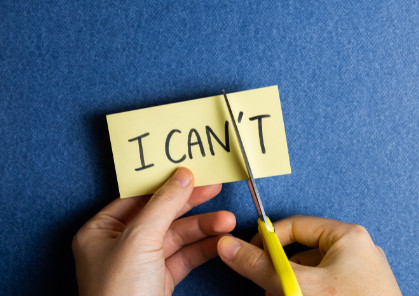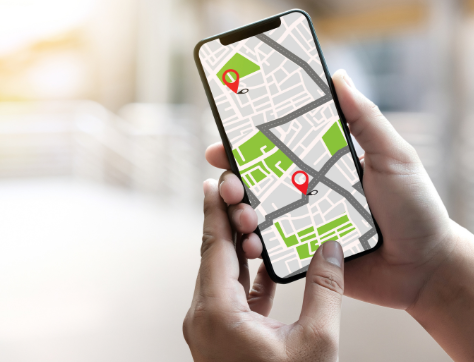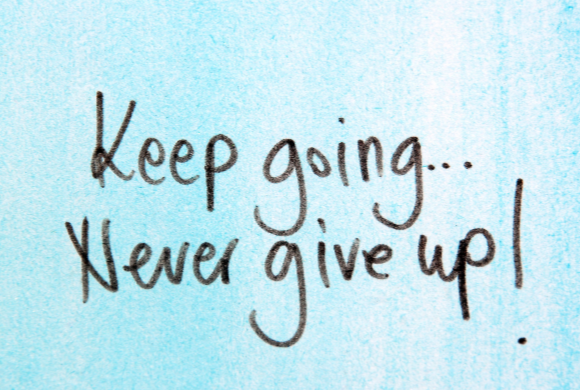
CLICK FOR PAGE 2 PDF
We all know what to do to lose weight, quit smoking, stop any bad habit or create a good one. Knowing is definitely not the problem! So, then what is it? Why is it so hard to really change our behavior? The fact is, change is simple but it's not always easy because our habits are engrained behaviors we do unconsciously and without effort or even knowing we're doing them. Of course, changing them is hard! But, we can also sabotage our efforts in other ways, like any of the following 8 fallacies:
1. Negative motivation.
Sometimes negative emotions like regret, shame, fear, and guilt can lead us to examine ourselves and decide to change. This can look like, "I'm not happy with the way I look or feel. I don't have the energy to play with my kids. I need to make some changes." While we may think negative emotions would motivate us to change, and they can help us get started, they are not ideal for creating lasting behavior change.
Studies have consistently shown that the least effective strategies for change were fear and regret. Oftentimes, negative motivation can just perpetuate negative emotions like stress or anxiety. It's hard to convince ourselves we can or deserve to look or feel better if we are motivated by negative emotions like fear or regret. This can make it challenging to push thru or overcome obstacles.
Real change needs a positive platform to launch from; you need positive, self-edifying reasons for taking on the challenge. This can look like, "I can be happier, healthier, and feel better about the way I look and feel. It's possible for me to create healthier habits, lose some weight, and have more energy so I can enjoy playing with my kids." This is acceptable even if it's not 100% true for us, yet. Embracing positive and self-edifying reasons offers some grace for ourselves. If/when we struggle, having some compassion for ourselves and these positive motivations can be uplifting and encouraging. They can inspire us to not give up, rather than the negative emotions that would only reinforce our perceived failure.
2. Cognitive distortion.
We tend to overthink behavior change and it's easy to take on an all-or-nothing mindset. This can look like, "I'm going to stop smoking and if I can't even do that, I guess I'm just not meant to live a healthier life." The problem with this is we're setting ourselves up for a no-win situation. Chances are the motivation we start with will subside. So we may go weeks without a cigarette and one stressful day or circumstance has us smoking, so we just throw in the towel? We say, "What's the point?" and just continue smoking?
Instead, I encourage us to celebrate the progress we made and forgive ourselves for smoking this time. Showing some grace and self-compassion, acknowledging we're only human but knowing that it’s still possible to break the bad habit if we keep trying. One setback does not need to be a deal breaker.
3. Unrealistic expectations.
There's a saying about eating an elephant can be overwhelming. Some people may look at the huge task and actually get discouraged because it's impossible.. but it's not actually expected that it has to be all done, all at once. That's why we just start somewhere and take it, one bite at a time.
Habit change is no different, we must set realistic expectations and not get overwhelmed. Instead of big and vague goals, we must start somewhere, with small and specific actions. Rather than, “I’m going to start exercising,” try “I’m going to get up 30 minutes early so I can walk on the treadmill before I get ready for work.” Establishing specific goals is essential to success. How do we hit a target we don't aim for? But it also helps us take specific action steps towards behavior change, which is one forkful in eating the giant elephant. It's by taking the tiny bites of action steps, over time, that all add up to us accomplishing the goal.

4. Ill-prepared.
We would not be able to replace our tire and fix our car if we didn't have all the tools, supplies, skills, or know-how, would we? Well, we also would not be successful in creating sustainable habit change without all the proper tools, supplies, skills, or know-how. Whether we are implementing a new diet or exercise regimen, trying to replace bad habits or stress less, we need the right support to accomplish the task. These can vary and be specific to the individual and the desired goal, but helpful resources can include knowledge, plans, systems for organization, tips, and tools. Our success is determined by having the right tools and skills, which can be gained from books, podcasts, youtube, a coach, or someone who's done it before. We need something or someone to help guide and support us, so we can rely on them to navigate through uncharted territory to achieve our goals.
5. Overcommit.
Sometimes when we decide to make a change, we try to change everything, all at once. This can look like many well-intended New Year's resolutions of trying to be healthier. That doesn't seem like a lot, but even if we join a new gym and commit to eating healthier, it can all add up to a lot of new challenges. Joining a new gym might mean changing our schedule, do you go before or after work? In addition to exercise time, do you have to allow for more time in your commute? Are you familiar with the exercises and equipment? Do you have support to help you overcome obstacles and hold yourself accountable?
Add all of this to trying to create healthier eating habits. Do you have your recipes and groceries ready? If you are preparing meals that are not familiar, it can take some time to get used to it which may take a bit more time and energy. It may be overwhelming to not even know where to begin knowing what to eat, what not to eat, and how to do it all. Trying to commit to all of this sets us up to have one bad day, where we are short on time, energy, or motivation so we don't go into the gym and we pull into a fast-food drive-through on the way home instead.
Change is simple, but not always easy, and committing to a lifestyle change is commendable. It can be done but trying to take on multiple behavior changes at once can lead to abandoning any or all of them. We have limited resources of attention, motivation, and self-control and if we try taking on too much, on top of everything else we deal with in our daily lives, we won't have enough resources to handle the changes. Plus, our brains are designed to pick the comfortable, easy path, with the least resistance and we all know that we can easily become distracted and motivation is unreliable. So, in order to make lasting changes, we should focus on one thing and take small steps toward implementing the habit into our lives. We can make small adjustments and replacements, incrementally as we build up and strengthen our willpower and discipline to follow through with habit changes.

6. Unclear plan.
As I touched on in a couple of the other points, the idea of change can be quite simple. Want to stop smoking? Just stop smoking right?
But again, the action necessary to make the change typically is More complex and often we underestimate this. Habit change is never just one thing. It will typically involve a lot of connected pieces and requires several steps to actually implement and successfully create lasting change.
It can be a challenge to move the needle even a little bit, which is also why it's very important to have a good system or plan in place. Have you ever gotten into your vehicle for a cross country road trip and just started driving? No, of course not. What do we do? We pull up our navigation system and enter the destination to follow the directions. Change is hard enough and if we don't have a clear route or a destination, how do we know what the directions are to get there? This only further complicates the process and what happens when it gets complicated? We stop trying and give up.
This is why for habit change, it's very important to be very clear on our goals and understand the process. We need to know how we're going to get there. We should appreciate the complexity and the time it will take us to complete multiple steps that it will take.

7. Failure is Final.
To me, this one is a pretty important one for us to address. We forget that failure is a part of success. Often times we begin with the best intentions to maybe start an exercise program and if we miss a day or two then we think we failed and instead of just accepting that it's part of the process, we feel defeated and quit.
As creatures of habit, we do this in all areas of our lives. Habit change is complicated and messy and it takes time. It's not going to be perfect and we’re not going to get it the first time we try. There’s a process. It's going to be something we have to keep working at and even if we fail we need to keep going and keep going. Do not give up.
Sometimes when we do fail it actually can identify something that we should pay a little closer attention to or focus some more energy on the next go around. So if we're trying to create a new habit of exercising but we can't seem to get ourselves out of bed after the second day then that's probably a area that we should focus some more time on What do we need to do to change this step in the process. Do we need to work out at a different time in the day? Do we need to put our phone or alarm in another room to help us get out of bed? Or possibly go to bed a little earlier so it's easier to get up in the morning and stick to our plan.
Like anything, when we are changing our habits failure, is part of the process. If we can accept that failure is not the end it's not the final step. We shouldn't get defeated or give up but rather accept that it is just part of the process.
8. Not Committed.
Research tells us that if we haven't made a commitment to accomplish whatever goal we are aiming for it won't happen. There are several reasons that a commitment for yourself is needed. First, think about when we make a promise or commitment to someone else - it's harder to break right? We don't want to hurt that person by not keeping our promise We don't want to break that trust. So we do everything we can to keep that promise right? We don’t want to hurt that relationship by not following thru.
Well the problem when we are setting a goal for ourselves, often times we just set a goal, but don’t really take the next step of Making the Commitment with ourself. Doing so tells ourself that this is something that is very important and it can become a priority in our mind body and spirit. It can change the way we show up for ourselves! Make the commitment and show up, just like you would for someone else. Don’t break that trust and ruin your relationship with yourself.
Another part of the commitment should be to tell someone else. If we don’t, there’s no one else involved so it can be easier to break that promise. If we make a promise to ourselves but no one else knows about it, then no one knows if we break a trust with ourselves. If something is important enough to us, we tend to find a way to make it happen. If we tell someone else, we’re more likely to hold ourselves accountable or they may even be able to help support or encourage us with it, too.
Finally, commitment helps us avoid any pitfalls in our willpower. Motivation is unreliable (in fact that’s another topic I’ll go into at a later date). So when motivation is gone or we stumble it's often easy to begin negotiating with ourselves. But The more committed we are the more likely we are to achieve our goals and so I encourage you that if you make the decision ahead of time. If you commit to yourself that this is a goal that you want to achieve then it can take all of the negotiation and any questions about what to do, when to do it, or how to do it out of play.

Again, these are things that we incorrectly believe as truths or we should look at a little differently. They can sabotage our efforts in successfully achieving our goals and creating lasting habit change. I encourage you to consider the list and pick out a couple that stood out to you and work on tackling them so you can make the next habit change a success!
Does this blog help you?
You help me by leaving a comment under the blog or just sharing it with other women who need it.
Do you have a question?
Then I will blog about it! contact me

Shall I show you how to elevate your life and achieve your goals?
Let's transform your life together!

Introducing the Elevating Purposeful Women Gameplan: UnlockYour Full Potential
Are you tired of merely surviving and ready to start thriving in every aspect of your life? As a health and life coach, my mission is to empower purposeful women like you to elevate their lives from a state of simply existing to one of true fulfillment. Imagine having boundless energy, unwavering confidence, and a lifestyle that allows you to stress less and enjoy every moment to the fullest. It's time to unlock your full potential and become the vibrant, beautiful, and healthy woman you were meant to be.

Step 1: Define Your Goals
To begin your transformative journey, we'll work together to clearly define your personal, health, and/or lifestyle goals. Whether you aspire to reach a specific wellness milestone, build healthy habits, or enhance your overall quality of life, our gameplan will be tailored to suit your unique needs. By setting these goals, we establish a clear direction towards your vision of success.

Once your goals are crystal clear, we'll design a comprehensive roadmap that outlines the specific steps needed to achieve them. This roadmap will serve as your guide, providing you with the clarity and focus necessary to overcome obstacles and stay on track throughout your journey. With a strategically designed plan in place, you'll gain the confidence to take action and make meaningful progress towards your goals.
Step 3: Implement Life-Changing Habits
True transformation happens when we embrace new habits that align with our goals. Together, we will identify key areas of improvement in your lifestyle and develop actionable strategies to integrate healthier habits seamlessly. From nutrition and exercise to stress management and self-care, we'll unlock a range of practices that will bring about positive change and support your overall well-being.

Step 4: Overcome Limiting Beliefs
Often, personal growth is hindered by the limiting beliefs and negative self-talk we unintentionally hold onto. We will work on identifying and reframing these limiting beliefs, replacing them with empowering thoughts and self-beliefs that will propel you forward. By rewiring your mindset, you'll cultivate a resilient attitude, greater self-compassion, and an unwavering belief in your ability to conquer any challenges along the way.

As you progress on your journey, I will provide ongoing guidance, support, and accountability to ensure you stay on track towards achieving your goals. Through regular check-ins, coaching sessions, and access to additional resources, you'll have the encouragement and tools necessary to overcome setbacks, celebrate successes, and unlock your full potential.
Are you ready to transform your life and become the empowered, purposeful woman you were meant to be? Say goodbye to simply surviving and step into a life of thriving. It's time to prioritize your well-being, unlock your energy, radiate confidence, and cultivate a vibrant, beautiful, and healthy lifestyle. Let's embark on your Elevating Purposeful Women Gameplan journey together.
xoxo,
April
Does this blog help you?
You help me by leaving a comment under the blog or just sharing it with other women who need it.
Do you have a question?
Then I will blog about it! contact me




